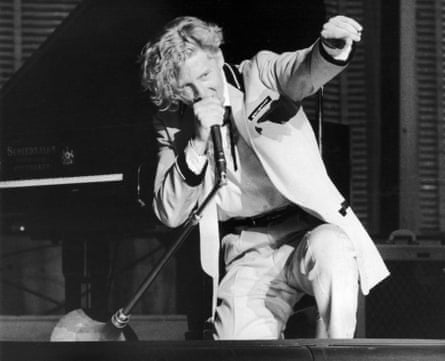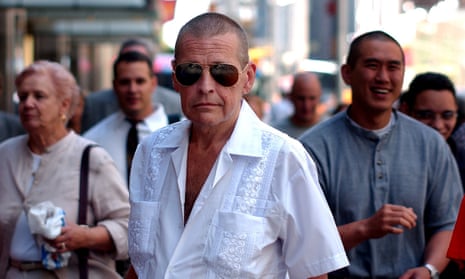The late Nick Tosches would doubtless have been furious to be described as a music journalist. He wrote far more about other subjects than he ever did about rock and pop: biographies of sportsmen and mafia-linked Italian bankers, books about drugs, books inspired by modern art, a slew of novels and poetry collections. Even when he reprinted his early work as a rock critic in the 2000 collection The Nick Tosches Reader, he was inclined to dismiss it as “making a mess on the page”.
Indeed, there was a grain of truth in that description. Like the other pioneering rock critics who earned the soubriquet the Noise Boys – Richard Meltzer and Lester Bangs – Tosches was clearly a lavishly gifted writer from the off, but his early work had as much to do with a particularly rabid form of iconoclasm as it did prose. Not for Tosches et al the scholarly approach of contemporaries Greil Marcus or the self-appointed “Dean of American Rock Critics” Robert Christgau (“a pompous asshole,” according to a drunken Bangs). The Noise Boys arrived during an era, not wildly unlike our own, where certain artists had become so revered as to be untouchable, apparently beyond criticism: never a healthy state of affairs, and one they set about trying to dismantle. For Lester Bangs, rock music had lost its way since the mid-60s: what was needed was a return to the basic values that informed garage rock.
Tosches went even further. His real passion was 50s rock’n’roll, or better yet, the music that immediately pre-dated it, the stuff he covered in his books Country: The Twisted Roots of Rock’n’Roll, and Unsung Heroes of Rock’n’Roll: The Birth of Rock in the Wild Years Before Elvis. It was, he later said, an era of “freedom … it wasn’t only a free market, it was blind. They didn’t know what they were selling or to whom. These small record companies would put out polar opposite product in one breath … a lot of amazing stuff emerged in the process.”
Another way of pricking their own era’s pomposity was to refuse to take their job seriously: “The premise that pranks ’n’ antics were the basic, irreducible nub of any true rock experience,” as Meltzer put it, a thought compounded by the fact that music journalism was still in its infancy. The magazines they wrote for were more or less making it up as they went along, the pay was paltry – “less than the price of a carton of cigarettes,” Tosches subsequently protested – and you survived by blagging free albums and meals from record companies: you might as well have fun.
Bangs wrote features inventing entire careers for mid-60s one-hit wonders he’d taken a shine to and wrote features calling for singer-songwriter James Taylor to be murdered; Meltzer was as offensive as possible; Tosches was wont to review albums without actually mentioning the music, or in some cases, even listening to the music. He reviewed Black Sabbath’s Paranoid under the misapprehension that he was listening to an entirely different band called Black Widow and was fired by Rolling Stone for colluding with Meltzer to write reviews then publish them under the other critic’s name.

Perhaps understandably, the results were variable. At its worst, it was as self-indulgent as the artists they affected to despise, filled with attitudes and language that simply wouldn’t fly today. But when Tosches or Bangs hit a seam of inspiration, their writing was thrilling – a chaotic, pugilistic blend of New Journalism, Hunter S Thompson’s gonzo approach and street-smart wise-assery. It could be extremely prescient: stories vary but there’s a compelling argument that Tosches was the first person to use the word “punk” to apply to a rock aesthetic, in a July 1970 feature that claimed “poetry is puked, not plotted”. It could be insightful: Tosches famously dismissed George Harrison’s 1971 Concert for Bangladesh in a piece he headlined The Heartbeats Never Did Benefits, an obscure 50s doo-wop quartet from Queens having more value in his world-view than a former Beatle’s well-meaning, but ill-considered philanthropic efforts. He thought the end result was pompous, noting that the audience “didn’t give a fuck about Bangladesh”, bemoaning that rock’n’roll should not “adopt pretensions of meaningfulness outside of that of a self-contained expression, matrical and flashing”, which is pretty much the debate that still rages every time a grand charity gig – in the Concert for Bangladesh’s image – is announced.
Tosches professed to loathe the increasing respectability of music journalism as the 70s progressed – “the vital part of rock writing died when these legitimate straight magazines started covering rock’n’roll on a regular basis … places like People and Time, and then the writing in Rolling Stone became more like that.” Uniquely, among his Noise Boy peers, however, Tosches proved equipped to transition from the world of what he called “spontaneous, natural fun” to something more mainstream.

The joy of books such as Country, The Unsung Heroes of Rock’n’Roll and, especially, Hellfire, the 1982 biography of Jerry Lee Lewis that was subsequently called the greatest music book of all time by both Rolling Stone and the Guardian, was Tosches’ ability to marry the two-fisted vitality of his best early 70s writing with things that he once would have scoffed at. For a man who boasted about reviewing albums without taking the shrink-wrap off them, these were clearly the products of meticulous research into everything from Lewis’s ancestral history to country’s forgotten roots in the blackface minstrel tradition.
But Hellfire’s real power is in Tosches’ prose: quite aside from the fact that he had alighted on a genuinely insane story of wildness and excess, Tosches truly believed that Jerry Lee Lewis was a greater talent than Elvis Presley, and his passion ignited his writing. He wrote about Lewis’s career as if he was writing a Great American Novel, imagining events in Lewis’s life as a gritty novelist would, his style inspired in equal parts, he claimed, by the Old Testament and William Faulkner.
It’s hugely informative, but never dry: the book grips you from its astonishing opening – a drunk Lewis paying an unscheduled visit to Graceland with a loaded gun in 1976 – and never lets go for 300 pages. Reading it, it’s hard not to wish that Tosches had written more long-form books about rock’n’roll, but he didn’t. Lewis was, he said, “one of the very, very few living characters who intrigued me”, and after telling his story, he moved on: to Sonny Liston, Dean Martin, blackface minstrel Emmett Miller, Arnold Rothstein.
In his later years, he professed himself no longer interested in rock music, although perhaps that wasn’t entirely true. A journalist who met him in the early noughties found him raving about a wildly obscure doo-wop single by the Rocketeers he’d unearthed that delighted in the title I’m Gonna Feed My Baby Poison. On the quiet, he was clearly still digging out forgotten music that he thought got to the root of what rock’n’roll was really about, that didn’t adopt pretensions of meaningfulness outside of that of a self-contained expression.

Comments (…)
Sign in or create your Guardian account to join the discussion